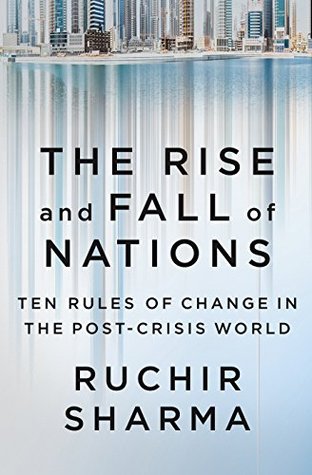More on this book
Community
Kindle Notes & Highlights
Read between
August 6 - August 18, 2017
Britain’s population growth is strong for a rich country, and it is a magnet for economic migrants (despite its closed door to war refugees).
With progress stymied, Spain’s progress now rests on the momentum of past reforms, and its prospects have slipped.
Today France is widely seen as the new sick man of Europe—the label that had attached to Britain in the 1970s and Germany in the 1990s.
Poland, the Czech Republic, and Romania have capitalized on their proximity to Germany and the rich markets of western Europe.
The Czech Republic’s economic prospects now rank among the best of the large emerging nations.
Before the election, the country scored well on eight rules, but now it looks good on six, with the politics turning ugly and the state bureaucracy tightening its hold on the economy.
Boosted by propaganda trumpeting Russia’s recent territorial grabs in Ukraine and intervention in Syria, Putin remains stunningly popular—his approval ratings are officially reported at 90 percent, at a time when economic troubles are undermining the popularity of other leaders all over the world.
Putin’s basic failure is that he never diversified an economy that remains dependent on oil, and it has collapsed with oil prices.
the Gulf is now the opposite of South Asia: It is the only subregion in the world where all the economies are likely to decelerate in coming years.
Overall, South Africa looks a bit less ugly judging by the rules than a country like Russia.
a glance at a map of the continent shows that the good stories are emerging in the east, around Kenya, and the worst are welling up in the west, around Nigeria.
Nigeria needs to find a way to break the bad saving and investing habits typical of a nation with an abundance of natural resources.
While growth is likely to be lower across the world as depopulation, deglobalization, and deleveraging accelerate, some nations will continue to rise even in this slow-growth world.
In the developed world, the list of nations with relatively good prospects includes Germany and the United States; in the large class of middle-income nations, much of eastern Europe and Mexico seem well poised for growth; among low-income nations, the relative stars are likely to emerge from South Asia, East Africa, and parts of Southeast Asia.
Also, if a global recession does materialize this year, as currently feared, it will be difficult for any country to achieve a “good” growth rate in the near future. But this phase too shall pass, given that global recessions typically last a year, and the outlook here is for the next five years.
Every nation is destined to go through periods of expansion and decline, and none is destined to rise, or fall, forever.
In an impermanent world, the only constant is the turning of the economic and political cycles that govern the future.


